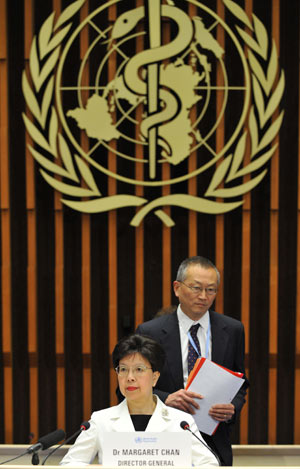| The World Health Organization (WHO) on Thursday raised its pandemic alert to the highest level of six, formally declaring that the widely spreading A/H1N1 influenza has developed into a global pandemic.
"On the basis of available evidence, the scientific criteria for an influenza pandemic have been met. I have therefore decided to raise the level of pandemic alert from phase 5 to phase 6, the world is now at the start of the 2009 pandemic," WHO Director-general Margaret Chan told a news briefing in Geneva.
 |
|
World Health Organization (WHO) Director-General Dr Margaret Chan(front) delares in Geneva that WHO has decided to raise the current A/H1N1 flu alert to its highest level of six on Thursday (XINHUA/AFP) |
Chan made the announcement following consultations with leading influenza experts around the world through a teleconference, and amid signs that community-level transmission of the new H1N1 flu virus has occurred in a number of countries outside of North America, including Australia, Chile, Britain, Spain and Japan.
Chan stressed, however, that governments and the public should have a right understanding of the word "pandemic," which mainly reflects the geographic spread of the virus, instead of the severity of the disease it has caused.
"We want to make the clarity that the higher alert level of the pandemic does not necessarily mean that we are going to see a more dangerous virus, or many more people falling severely ill or dying," she said.
She said current assessments made by experts suggest that the first pandemic in the 21st century should be a moderate one in terms of severity.
"On present evidence, the overwhelming majority of patients experience mild symptoms and make a rapid and full recovery, often in the absence of any form of medical treatment," she said.
She added that the current number of deaths is small worldwide. The world should be braced to see more deaths from the disease but "we do not expect to see a sudden and dramatic jump in the number of severe or fatal infections."
The WHO chief warned, however, that countries should keep their vigilance and avoid "complacency" because of the uncertainty of the disease situation.
"The tendency to move into complacency is of great concern to the WHO, because we need to continue to monitor this disease, follow its track and ... not allow it to come back in the second wave to give us more trouble," she told reporters.
Chan also stressed that with the moving from phase 5 to phase 6,countries and public health authorities need to recalibrate their responses "to be in keeping with the evolution of the outbreaks in their own country."
"The WHO does not want to provide one set of recommendations to all countries. Clearly that is not pragmatic," she said, adding that governments have their own space and flexibility to readjust their measures.
She reiterated, however, that the WHO does not recommend closure of borders and there should be no restriction of movement of people, goods or services.
Answering questions about H1N1 vaccine, Chan said the WHO has been in regular dialogue with vaccine manufacturers.
She said manufacturers are expected to finish production for seasonal influenza for the northern hemisphere very soon, and then the WHO would advise them to quickly prepare to make commercial-scale pandemic vaccine.
As of Thursday, 74 countries and regions have officially reported 28,774 cases of A/H1N1 influenza infections to the WHO, including 144 deaths.
Most of the deaths occurred in Mexico, where the new virus was first identified. Deaths have also been reported from the Untied States, Canada, Colombia, Costa Rica and the Dominican Republic.
(Xinhua News Agency June 12, 2009) | 